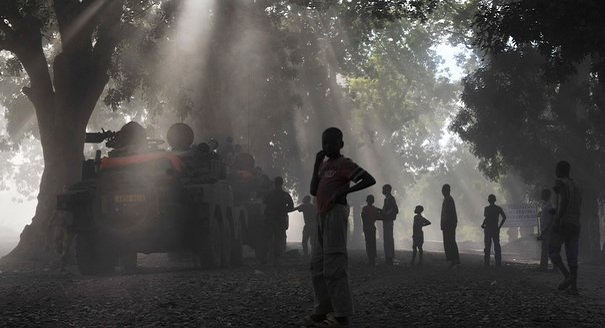In less than two weeks, Mali has become the new paradigm of European security thinking. Analysts across the continent seem to agree, by and large, that this latest French intervention in Africa shows us the future of hard security for Europeans: small footprint operations that are low in intensity and of limited duration, conducted by one nation or, at best, a small coalition of the willing.
The case of Mali seems to confirm various other elements of conventional post-Afghanistan security thinking, too: large deployments are over. Conventional warfare has been replaced by asymmetric threats. Small groups of allies can react more swiftly to developments than big alliances. Failing states are our primary security threat because they create a power vacuum easily filled by militia and terrorist forces hostile to Western modernity. Nation building is too expensive, both monetarily and politically. Plus, the United States will leave Europe’s backyard to the Europeans. In that sense, Mali is the intervention everybody has been thinking about, in an abstract way, for the last few years. Now it’s finally there, and we can lean back and congratulate ourselves on our own smartness.
In reality, however, the mission in Mali is of very limited use as a blueprint for the future of European security. It might work for parts of Africa. But it is useless in the Middle East, Iran, the Arctic, and the Balkans, all of which present security concerns in Europe’s immediate neighborhood. It is even less useful for any scenario that involves long-range naval deployments to international choke points, such as the anti-piracy operations conducted off the Horn of Africa. It loses all relevance for a geopolitical threat scenario in which Europeans would have to come to the aid of the United States in order to free up American military capacity needed to keep things stable elsewhere on the planet.
The Mali operation is not only a treacherously convenient indicator of what lies ahead, it also is an extremely complex undertaking in its own right. Apart from the obvious issues of capability shortcomings and the absence of the EU, it poses a question of strategic importance to the Europeans: have they really given up on nation building? In other words: will Europeans conduct Mali-type military operations as strictly limited one-off, in-and-out missions, designed to keep the worst from happening, but without any ambition of creating long-term stability?
After the sobering experiences of protracted deployment in Afghanistan, many favor such a limited approach. And at first sight, it clearly seems to be the much easier, much less costly strategy. But embracing military short-termism would have at least two important strategic implications. First, Europeans would (at least partly) have to give up on their long-held conviction that a sustainable development policy is preferable to short-lived military solutions. This could change the nature of Europe’s role in the world and Europe’s image as a mostly civilian, soft power player. Secondly, as short-term military interventions rarely remove the root causes of conflicts, Europeans would probably have to be ready to deploy their soldiers much more often and repeatedly in the same areas, which could turn out to be just as costly, both politically and monetarily, as the previous, more long-term approach.
As it becomes clear even from these cursory thoughts, Europeans will have to make tough choices about their hard security posture, and the Mali operation adds to the pressure to do so. Europeans have been postponing these decisions for almost two decades. They are now learning the hard way that reducing military capabilities makes a strategic debate about one’s role in the world more important, not less. Mali has laid bare the strategic shortcomings of European security thinking. It is now time to address them—both for the sake of future conflict areas and of Europe.






